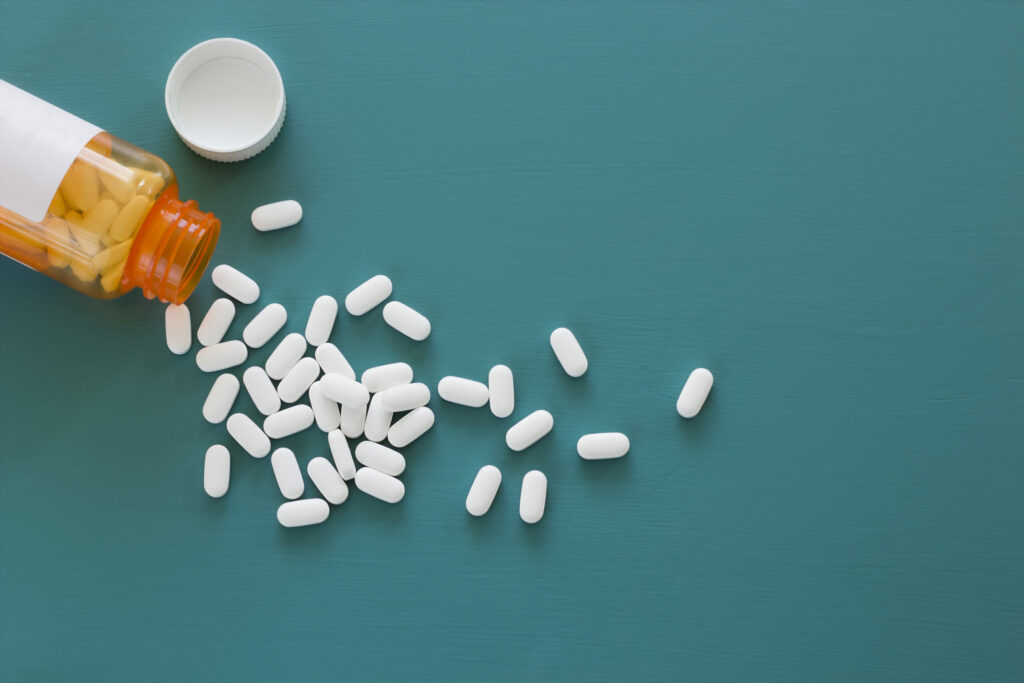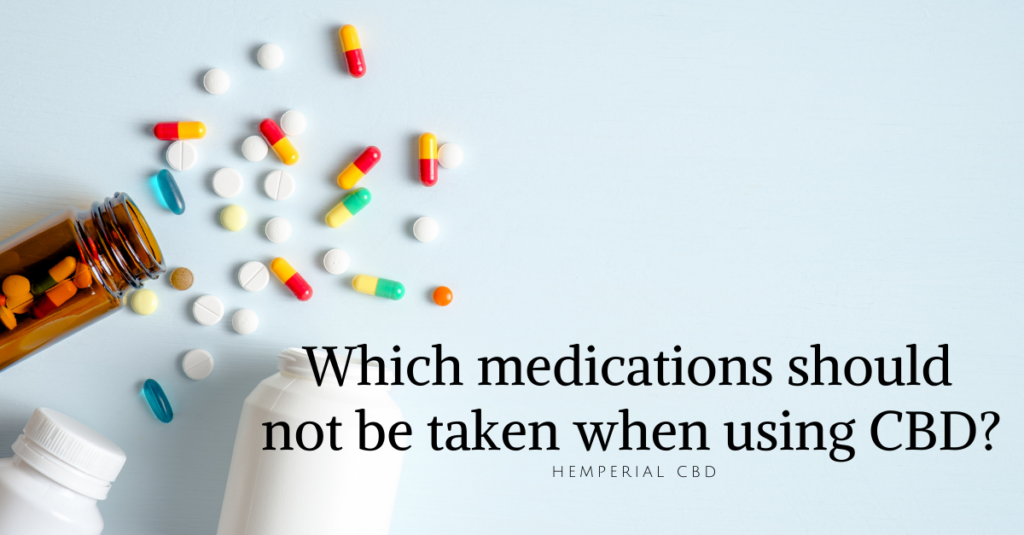You may have been wondering which medications should not be taken when using CBD? This is a question that comes up often. Possible CBD interactions are nothing new because it is well known that taking supplements and medications at the same time might cause internal reactions.
Your doctor will specifically inquire about the medications you are taking when you discuss how to treat your problem with them. That doesn’t imply that doctors are nosy nosers; they simply need to be aware of it in order to follow the first rule of medicine: first, do no harm.
Cannabis, which is the source of CBD, has a lengthy history of being used medicinally by almost all cultures, which has spurred civilizational advancement. It has been utilized since 10,000 years ago. One of the two main chemicals responsible for the possible therapeutic uses of cannabis-based products is CBD.
But CBD oil is a relatively new product on the market as a health supplement.
As a result, it is quite reasonable and acceptable that you are concerned about how CBD interacts with medicines and the danger connected with them.
No detail will be overlooked in this article’s explanation of the topic. We’ll also include the drugs that shouldn’t be taken with CBD due to the interactions mentioned above.
CBD and Drug Interactions: All the Information You Need
One of the more than 100 cannabinoids that are released in the resinous sections of cannabis plants is CBD (cannabidiol).
Due to its numerous potential therapeutic uses, CBD has swept the field of modern research. According to research, CBD may be able to assist patients effectively manage a variety of symptoms without the risky side effects linked to conventional medicines.
Furthermore, unlike THC, the other cannabinoid found in cannabis that is most plentiful, CBD is non-intoxicating and won’t result in the psychoactive high associated with marijuana use.
In actuality, the majority of CBD oils on the market come from hemp plants, which have a THC content of 0.3% or less. The Hemperial CBD line of products is legal and won’t give you a high or stoned feeling.
The most well-known benefit of CBD oil is its capacity to reduce symptoms of epilepsy, anxiety, psychosis, inflammation, addiction withdrawals, pain, and skin conditions. According to studies, CBD can cause cancer cell death in some types of malignant tumors.
As preventive supplements, people also utilize CBD products to support the body’s endocannabinoid system, which serves as the major regulatory mechanism in all vertebrate mammals.
Overall on its own, CBD is a Safe Substance
The vast majority of scientific studies show that using CBD oil alone is safe. However, it’s also a very potent substance that can interact with a number of bodily systems, including the one in charge of processing drug active components.
Let’s investigate why taking CBD with other chemicals, such as prescription medications, can make it less benign.
Understanding CBD and Medicine Metabolism
Before examining how CBD affects drugs, it is important to understand how they are processed. You may read more about the systems involved in the metabolism of CBD and how it affects Cytochrome P-450 in the section that follows.
Metabolism: What Is It?

When you hear the word “metabolism,” what comes to mind?
The majority of individuals link metabolism to how quickly or slowly they gain and lose weight. The basal metabolic rate is the term used to describe this type of metabolism. It specifies the number of calories an individual needs to maintain proper functioning while at rest.
However, metabolism and basal metabolic rate are two separate concepts.
The process through which the body breaks down and utilizes the active components in food, vitamins, and medications is referred to as metabolism. The gut and liver are where the vast bulk of metabolic processes take place.
The “first pass effect” is a process that occurs when you consume CBD edibles or capsules.
To put it simply, the liver breaks down the food you ingest into its component parts so the body can utilize it effectively.
For instance, amino acids are formed from proteins, triglycerides from fats, and sugars from carbs. Enzymes then transform these substances into metabolites, which the body can use as fuel or in regenerative processes or the creation of new cells.
The aforementioned also holds true for medication metabolism. Drug metabolism describes how quickly the liver breaks down supplements and drugs and how long they remain in the body.
What does a typical CBD transportation route look like then?
Oral forms of CBD must travel via the digestive tract, where it is initially digested, before entering the bloodstream through the hepatic portal. Once there, enzymes in the liver break down CBD into its metabolites, letting the substance to circulate further throughout the body.
The Cytochrome 450 System: The Metabolism of CBD and Medications
The liver not only converts chemicals into metabolites but also detoxifies and aids in the removal of harmful substances such as drugs from outside the body. The cytochrome P450 system, a unique class of enzymes that uses heme to transform fat-soluble chemicals into more water-soluble compounds to aid the body’s absorption of them, is the method by which it accomplishes this.
Over 60% of any foreign substance that people consume is processed by the cytochrome 450. This approach is used by doctors to determine patient prescription dosages, forecast effects, and identify any potential side effects.
Certain drugs can interfere with the Cytochrome P450 system’s regular processing of pharmaceuticals, leading them to metabolize more slowly or more quickly than usual.
One of those chemicals is CBD.
How the Cytochrome P450 System Reacts to CBD
CBD has the ability to directly impact the liver’s Cytochrome 450 system. Preclinical investigations suggest that CBD affects this system via binding to the location of the enzyme activity. By doing this, CBD transforms into a “competitive inhibitor,” stopping the Cytochrome p450 from metabolizing other substances.
The quantity of CBD consumed, the user’s particular physiology, the kind of CBD product, and the strength of this inhibitory action on the cytochrome p450 all play a role in its potency. These elements govern how firmly the CBD molecules will obstruct the metabolic enzyme’s active site. CBD in higher doses seems to block more competition.
Simply said, when used with other drugs, CBD competes with them because it is typically digested first. This means that all drugs whose effects are activated by the Cytochrome p450 pathway can be rendered inactive by CBD.
Low amounts of CBD won’t have much of an impact on how your body metabolizes drugs, if any at all. Bigger quantities of CBD, on the other hand, will bind to a larger area of enzyme activity and stop a sizable portion of the other medication from being digested.
Why CBD Interactions Are Important to Watch Out For
CBD alters how your liver processes many medicines by affecting the Cytochrome p450 system. Simply put, they won’t be processed as effectively as they would have been if CBD hadn’t been there. There are two significant negative effects to this. Your drug will lose its effectiveness, and higher quantities of other substances may stay in the body for longer periods of time as a result.
This could then cause a number of secondary adverse responses, such as a weakened immune system, an increased risk of bleeding, or even worse, an overdose.
What Drugs Should Not Be Taken With CBD? – CBD Interactions

It’s time to emphasize the typical classes of medications that interact with CBD oil now that we have established the effects of CBD interactions with other substances when taken combined. If your doctor advises you to avoid eating grapefruit while taking CBD oil, this could be a sign that your medication could compete with CBD in the liver.
Another category of medications is referred to as “prodrugs.” Unlike most drugs, which are therapeutic chemicals themselves, these substances must be broken down into their medicinal constituents. Simply put, these medications must be digested in order for their medicinal ingredients to become active.
The Cytochrome p450 system inhibitors might make insufficient amounts of the active medication molecule available to the body, preventing it from exerting its therapeutic effect.
Examples of prodrugs: codeine, lisdexamfetamine
If you believe there may be a CBD interaction, always consult your doctor.
Remember that we have just mentioned the most typical medications that potentially interact with CBD. Not all of the drugs that can interact unfavorably with CBD oil are listed in the collection above. While not all of the aforementioned medications will have a major interaction, we nevertheless advise speaking with your doctor if you’re on one of these meds. If you’re interested in learning more about potential CBD-drug interactions, a skilled doctor should be able to guide you in the proper route. Your doctor will also keep an eye on any therapeutic benefits and unfavorable side effects of combining your current drugs with CBD. In a similar vein, your doctor can assist you in adjusting the dosages of your prescription and CBD so that you can safely take both substances at the same time.
Important Lessons on Possible CBD Interactions
A chemical with a known safety profile is CBD. Even when used at levels as high as 1500 mg per day, it is well tolerated and safe to use. Because CBD oil has such a powerful effect on so many different bodily systems, it can interact with a wide variety of pharmaceutical drugs.
You should exercise caution while combining CBD oil with any medications you are currently taking because they both work through similar pathways that make CBD so effective at managing many of our daily stresses.
Consult your doctor for guidance if you wish to use CBD in your routine but are concerned about the aforementioned CBD-drug interactions. By doing this, you can develop the best plan for your supplements and prevent the negative consequences of taking CBD along with some prescriptions.
